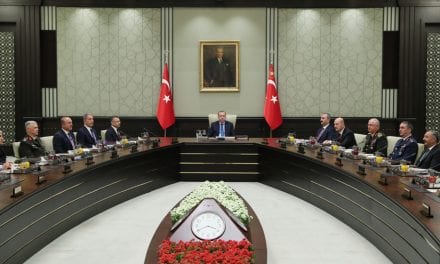By Louis A. Delvoie, thewhig.com
Last November, I published in this newspaper an article entitled “Chaos in the Middle East”. It was a largely descriptive piece in which I endeavoured to show that the situation in the region was now worse than it had been at any time in living memory. I did not suggest any remedies. In today’s piece, I raise a number of questions, which if answered in the affirmative, might lead to some attenuation of the current tensions.
Socioeconomic divides
For many decades now, most of the countries of the Middle East have been ruled by governments dedicated above all to the interests of their main stakeholders and to their own political survival. The rulers, their armed forces, their security and intelligence services and certain business elites have prospered. The vast majority of the population have not. Poverty, high rates of unemployment and housing shortages are endemic to most countries in the region. The discontent to which this gives rise is all too often suppressed, but does occasionally break out into the open as during the so-called Arab Spring of 2011. But it is this discontent that is at the root of so much of the disorder now prevailing in the Middle East. Can the governments of the countries concerned be persuaded to do more to ensure the social and economic progress of their citizens?
Ethnic and sectarian divides
Governments of Middle Eastern countries sometimes tolerate and sometimes encourage discrimination against minorities. The government of Egypt does not do enough to protect its Christian minority. The government of Iraq actively discriminates against its Sunni Muslim minority. The government of Saudi Arabia is hostile to its Shia Muslims. After a promising start at reconciliation, the current Turkish government is once again engaged in a war against its Kurdish minority. And in the Maghreb, Berbers often suffer from discrimination at the hands of Arab majorities. All of this contributes to unrest in the region. Can the governments of these countries be persuaded to adopt more enlightened policies likely to favour ethnic and sectarian accommodation and peace?
Israelis and Palestinians
The peace process involving Israelis and Palestinians has been totally deadlocked for several years now and periodic outbreaks of violence are the order of the day. And yet the outlines of a settlement are fairly simple and straightforward. The Israelis must accept the creation of a Palestinian state in the West Bank and Gaza and withdraw their settlements from occupied Arab territories, which are in any event illegal under international law. The Palestinians must recognize Israel’s right to exist in a secure environment, and must renounce the “right of return” guaranteed them by a 1948 United Nations resolution. This will certainly represent difficult compromises for both sides, but they are certainly not impossible. Can Israelis and Palestinians be convinced to finally make the compromises necessary to reach a two-state solution?
Iran and Saudi Arabia
Ever since the Iranian revolution of 1979, Shia Muslim Iran and Sunni Muslim Saudi Arabia have been engaged in an intense competition for influence in the Middle East and beyond. It is a competition that is both political and ideological, and in that sense it is reminiscent of the competition between the United States and the Soviet Union during the Cold War. In pursuit of their objectives, the two countries have provided support to rival political parties and movements in Lebanon, Iraq and Afghanistan. They have become actively involved in the civil wars in Syria and Yemen, providing weapons, money and military advisers to various factions fighting each other. Their activities have tended to greatly complicate and prolong a number of regional conflicts. Can Iran and Saudi Arabia be persuaded to end their expensive and counterproductive political and sectarian competition in the interests of regional peace and stability?
The Islamists
The rise of Islamism or political Islam has also been a major cause of instability in the Middle East. In countries where they have sought to pursue their objectives by essentially democratic means, they have challenged the authority of sitting governments and have been met by brutal repression (e.g. Algeria, Egypt and Syria). In countries where they chose to resort to violence, they have become actively involved in bloody civil wars (e.g. Algeria, Syria, Iraq, Yemen, Afghanistan and Somalia). And they have exported their terrorist attacks well beyond the Middle East, thus inviting retaliation by outside powers.
Different Islamist movements have different objectives. The most common objective is to convert more or less secular Muslim countries into Islamic states in which sovereignty rests with God and in which the political and legal systems are based on the Qur’an and the Sharia. Whether peaceful or violent, the Islamists have so far had very little success in advancing this cause, although they have become more prominent in the politics of formerly secular countries such as Pakistan, Indonesia and Malaysia. There is one important and fairly recent exception to this narrative and that is the Islamic State (IS). Its objective is not to convert Iraq and Syria into Islamic states, but rather to create a worldwide caliphate based on that which existed in the Muslim world in the seventh century. To that end, it has already secured for itself a much contested territorial base in Iraq and Syria.
What is clearly evident is that the vast majority of Muslims living in the Middle East and well beyond are not interested in living in Islamic states or in a reinvented caliphate. But they, rather than outsiders, are the ones who must come together to marginalize and isolate the Islamists. Outsiders, including western countries, can counter some of the violent manifestations of Islamism, but they are not well positioned to counter the ideas behind it. Only Muslims can do that. Can the Islamists be persuaded that their objectives are unrealistic and out of tune with the times?
Interventions by outsiders
At least two military interventions by outside powers go a long way toward explaining a lot of the bloodshed now besetting the Middle East. President George W. Bush’s decision to invade Iraq in 2003 had the effect of breaking the country apart. It was directly responsible for the creation of Islamist extremist movements where none had existed before. Those movements eventually produced the Islamic State, which is perpetrating murder and mayhem in Iraq and Syria today. The decision of President Vladimir Putin to intervene militarily in the Syrian civil war in 2015 has given a new lease on life to the blood-stained regime of Bashar al Assad. With the support of an indiscriminate bombing campaign by the Russian air force, Assad’s troops are once again on the offensive killing hundreds of civilians and forcing thousands more to flee their homes. Can outside powers be convinced that such military interventions only serve to worsen already bad situations?
Envoi
To return to the point of departure. If all of the questions raised above could be answered in the affirmative, then the Middle East might enjoy some peace and stability. But it would be a rare optimist who would hold his/her breath awaiting such answers.
Louis A. Delvoie is a Fellow in the Centre for International and Defence Policy at Queen’s University.



















